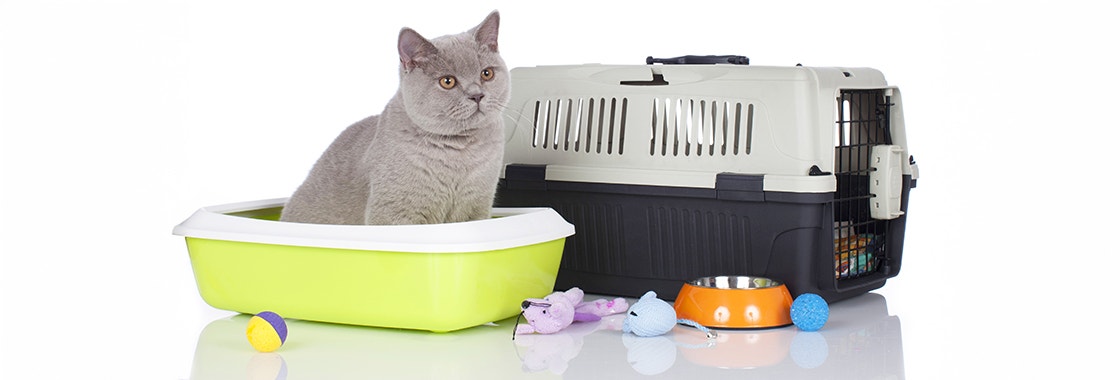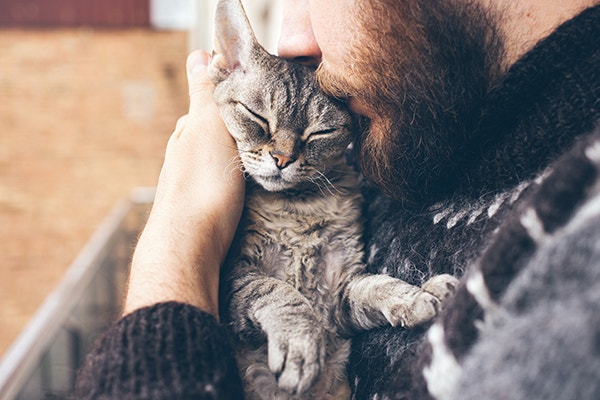- Homepage
- Blog
- Bonding & Care
- Getting A Kitten
Getting a New Kitten: Everything You Need to Know


Share
Getting a kitten is an incredibly exciting time for any new cat owner as you embark on this new chapter together! However, it also requires planning and preparation, as there are many things you need to gather before you welcome your new feline friend into your home. Kittens require special care and considerations, from kitten proofing your home to researching the best kitten food. In this article, we will cover the most important steps you need to take before your furry bundle of joy comes home with you. We will make sure you have all the items you need from your new kitten checklist, helping you avoid any unnecessary stress during this magical time.
What Do You Need for a New Kitten?
Getting a kitten is a joyous time for everyone involved, as you are about to make memories with your new addition that you’ll cherish forever. However, it can also be a testing experience if you are not well-prepared as kittens are demanding and require a lot of care and attention in those early days.
What do you need for a kitten? Check out our list of essential items below so you can hit the ground running with your new kitten prep!
- Kitten food: what food do you need for a kitten? Kittens require wet or dry food and treats that are specially formulated for their growing bodies; they should never be given food formulated for adult cats. Kittens need to be fed a complete and balanced kitten diet to ensure healthy development; they also require more energy and protein and vitamins and minerals in different amounts and ratios than adult cats. Complete and balanced kitten food contains all of the nutrients they need in just the right amounts. Check the back of the packet for adequate serving recommendations.
- Kitten bowls: what do kittens need to eat out of? It is best to buy bowls that are designed for kittens; these will be more shallow, so it is easier for them to eat out of.
- Litter trays and litter: what litter do I need for a kitten? It is advised that you buy a litter tray that is designed for kittens so they can access it more easily; litter trays for adult cats may be too high for their short legs. We also advise looking for a litter that is best suited to kittens and will be soft on their delicate paws. Check with the breeder to see what they have already been using so you can stick with a type of litter they are familiar with.
- Toys: What do kittens need to play with? Stocking up on a variety of kitten approved toys is also essential! Kittens are extremely playful, and you will need to help them burn off that excess energy as well as keep them entertained so they are less likely to cause mischief. Toys designed for kittens are often softer and less likely to hurt them.
- Kitten bed: what do kittens need for comfort? You may also want to invest in a cosy kitten bed for your new arrival, as well as soft bedding. However, they may even prefer a cardboard box lined with comfortable bedding.
- Kitten carrier: what do I need for transporting a kitten? You will also need a kitten carrier for all those necessary trips to the vet and to move them into their new home! You should aim to schedule their first visit for a check-up and vaccinations ahead of time. You may also want to look into pet insurance.
- Grooming utensils: what do I need for grooming a kitten? Make sure you buy a kitten approved brush or comb to get them used to a regular grooming routine early.
- Scratching posts, places to hide, cat trees, and overall kitten enrichment areas: kittens will want to mark their scent over their new home, so get them into the habit of using their scratching post early. Cat trees, boxes, hiding spots, and calming areas should also be added to the home
Choosing the Right Age to Get a Kitten
Getting a kitten at the right age is essential. Kittens should not leave their mother until at least 12 weeks of age; it can be detrimental to their overall development and socialisation skills if they leave their litters sooner. Kittens learn how to behave from their mothers and littermates. Leaving after 12 weeks also ensures they are fully weaned and litter trained. They are also less likely to have behavioural issues if they leave their litter at the appropriate time.
Preparing Your Home for a Kitten
What do you need to do for a kitten to feel safe around your home? Kitten proofing ahead of time is essential to make sure your kitten is safe from day one. This can sometimes feel overwhelming, so we advise kitten proofing one room at a time.
- Identify and remove any hazards, such as exposed electrical cords that may be chewed or sharp and dangerous objects.
- Keep toilet lids closed.
- Secure windows, balconies, doors and staircases.
- Lock away cleaning supplies and any other items that may be poisonous, such as plants or medications.
- Remove any choking hazards. Remove any dangling strings that they could climb up to play with and risk strangulation
- Make sure human food is stored away from curious paws.
- Secure bin lids.
- Block off any areas that may be dangerous for your kitten to explore, such as garages.
- Block off any small areas where kittens may become trapped, such as behind appliances.
- Make sure you keep all cupboard doors, closets, and drawers closed after use.
- Prepare a comfortable, safe space for your kitten to adjust to their new surroundings. This should include an area for sleeping as well as their food and bowls, toys, and litter tray.
Kitten's First Night: What to Expect
Getting your kitten used to their new surroundings slowly is important. You should introduce them to their new environment gradually, keeping them in a small, enclosed, and safe area at first. This area should have all the essentials they need. Ideally, they should also sleep here as they get used to their new home. Suggestions include a spare room or bedroom. Keep them in this safe space for their first night and during the adjustment period; they should also be kept away from children, other animals, and loud noises to reduce stress levels.
Not sure how often to feed your new kitten? Check out our other useful blogs for all the information you need.
Understanding and Caring for Your New Kitten
What do kittens need us to understand about their behaviour? Understanding kitten behaviour is essential when learning to care for your new kitten. Kittens are extremely curious and boisterous, so you will have to keep a close eye on them to avoid any accidents or injuries. They will soon begin to explore their new surroundings once they have adjusted to their new home. Kitten proofing your home early on is essential.
It is inevitable that they will test your boundaries during play, which includes scratching and biting, so patience and understanding is key. Never scold your kitten for bad behaviour, as this may cause distrust. Instead, focus on positive reinforcement using praise and treats. Make sure you dedicate time for at least 2-3 regular play sessions per day, around 15 minutes per play session. Kitten zoomies are to be expected, and you may be woken up during the night by their rowdy antics often. It is important to let them act on their natural instincts, even if those instincts include pretending your toes are prey. If you face other issues like carpet scratching, scratching posts can help, alongside positive reinforcement techniques such as using treats when they use them appropriately. Kittens also need a lot of sleep, so you will get some peace during those quiet moments; it won’t be non-stop zoomies! Kittens show affection by kneading, purring, and snuggling up to their owners. They may hiss or growl when they feel scared or threatened, often at unpredictable or first encounters of items such as the hoover. They will mark their territory around the home by scratching, which is why scratching posts are essential items from the get-go.
Generally, kittens should be fed 3-4 meals a day until they are 6 months old, this then drops down to twice a day. Kittens should transition to adult cat food only once they reach the age of one; until then, they should only be fed food formulated for kittens.
The 3 3 3 Rule for Kittens
The 3 3 3 rule helps us understand how long it takes for kittens to fully adjust to their new home. It is a very helpful way of evaluating how well they are adjusting based on various milestones. It also reminds us to have patience!
- 3 days: kittens usually take at least 3 days to decompress and get used to their new environment. The first few days can feel overwhelming for them, and they may hide away or withdraw until they get used to their new home. Be patient and let them adjust at their own pace.
- 3 weeks: it can take up to three weeks until kittens start settling in fully. During this time, you will notice that they grow in confidence around you and their environment. They will also begin to explore more during this period.
- 3 months: At this milestone, you will notice that your new kitten is starting to fully come out of their shell and feel at home. They will appear more settled and should be fully adjusted to their new routines. Their personalities will start to shine through as they feel more comfortable around you and in their home.
Curious about the weaning process? Check out our other blogs!
Getting a new kitten - FAQs
What is the 3 3 3 rule for kittens?
The 3 3 3 rule refers to the period of time it takes for kittens to adjust to their new home. It usually takes around 3 days for a kitten to get used to their new surroundings; during this time, they may hide or appear more withdrawn. After 3 weeks, your kitten will start to feel more confident around you and their environment, and you will notice they start to interact more and appear more at ease. 3 months is when they should become fully adjusted, feeling at home and safe. Strong bonds will usually form during this time. The 333 rule reminds us to be patient during a kitten's adjustment period.
Where should a kitten sleep first night?
During the first night in their new home, a kitten should sleep in a secure, quiet, and cosy area where they have access to all the essentials they need, including kitten food, fresh water, their litter tray, and a bed with soft bedding. This area should feel safe and calm to help them adjust to their new surroundings. It should also be free of children, other pets, or loud noises.
What is the right age to get a kitten?
Kittens should not leave their mother until they are at least 12 weeks old; getting a kitten before 12 weeks can be detrimental to their physical and mental development as well as their socialisation skills. Kittens learn social skills from their mothers and littermates. Leaving the litter after 12 weeks also ensures they are fully weaned and litter trained. They are less likely to have behavioural issues if they leave after 12 weeks.
Can a kitten be left alone during the day?
It is generally not advised to leave a kitten alone all day, especially when they are adjusting to their new environment. Kittens can, of course, be left alone for a short period of time, however, leaving them alone for more than a few hours can cause them stress and anxiety, especially when they are under 4 months old. It may also pose safety risks, as kittens can be very curious despite their vulnerabilities. Older kittens can be left alone for longer periods of time, but we advise having someone check in on them if they are going to be alone for more than 5-8 hours. It's important to remember that kittens can get lonely, and it is your responsibility to keep them safe, happy, and secure. You may also want to invest in a cat camera so you can keep an eye on them while you are away for short periods of time.











